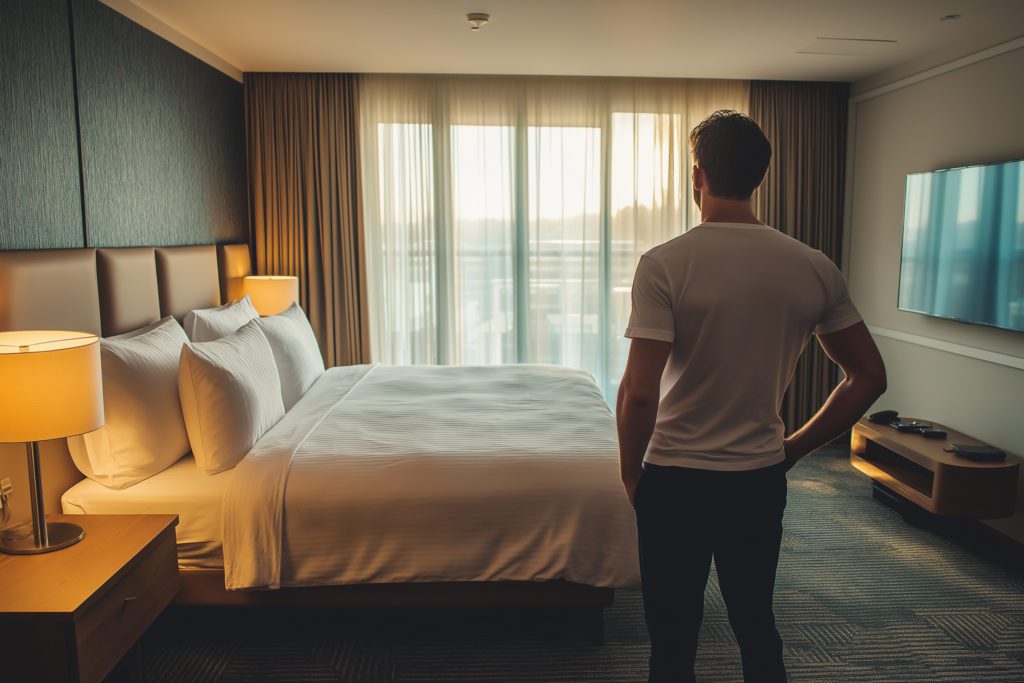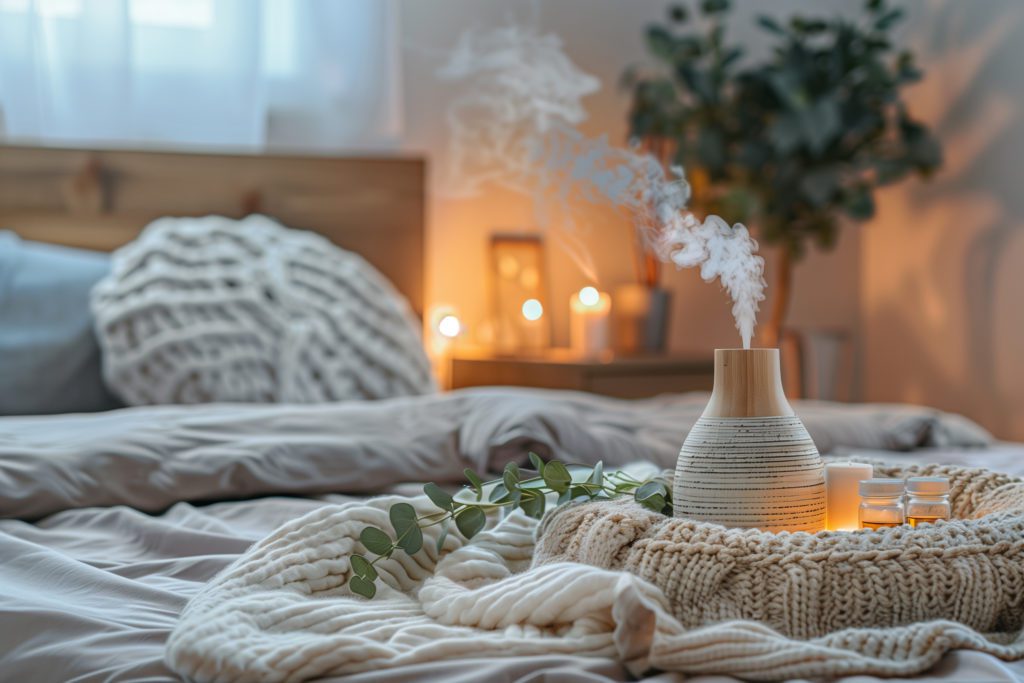
Creating the Ideal Sleep Environment for Introverts: Tips and Strategies
Here’s how to create the perfect sleeping environment for introverts. Dim lighting, sleep in a quiet pet-free room, wake up to sunshine in the morning.

For introverts, spending time engaged in social activities can be quite draining. After an evening of socializing with friends, you’d think that it would be easy to fall right asleep. However, for an introvert, being social can make it hard to wind down and fall asleep.
According to sleep psychologists, socializing can overstimulate introverts. It can flood the brain with cortisol, the stress hormone. This can leave a person feeling tense, irritable, and on edge. Physical symptoms, such as muscle aches or headaches are not uncommon. These issues can make it hard for introverts to sleep well.
Having the right sleep environment and following sleep hygiene tips can help introverts sleep better.
The Perfect Sleep Environment for Introverts
If introverts don’t have the right sleep environment, it can be hard for them to fall asleep. According to a study by LIFEAID, introverts tend to be more particular about sleeping in the right conditions. Introverts like calm environments. So, their sleeping environment should be relaxing and peaceful. The following things can help an introvert sleep better:
- Dim lighting - A dark environment will help you go to sleep. A small lamp with a warm color hue can help you prepare for sleep and transition to darkness.
- Quiet environment - Introverts are much more sensitive to noise. Therefore, use an ambient or white noise machine to block out sound from outdoors and elsewhere in your house. This can make it easier to sleep.
- Slightly cool room - Try to keep your bedroom between 60°F - 65°F. Studies have found that this is the ideal temperature to sleep. It can help reduce nighttime sweating which can interfere with sleep.
- Sunlight in the morning - Make sure your room gets plenty of sunlight in the morning. Sunlight signals to your body that it’s time to start your day.
- Pet-free zone - Keep the bedroom a pet-free area. Pets can be restless, which can stress introverts out. This could make it harder to fall asleep. Pets also move around in the night, which can disturb sleep.
- Pleasant smells - Studies have shown that certain scents can promote relaxation. It can help to use a pleasant-smelling light scent in your bedroom. Chamomile or lavender are both good choices for a bedroom. Just make sure it’s not too overpowering or it could interfere with your sleep.
Sleep Tips for Introverts
Getting enough sleep can help introverts recover from the dreaded “introvert hangover,” which happens when introverts spend too much time interacting with other people. This leaves them feeling drained and exhausted. Here are some tips to help introverts sleep better.
Stick to a Calming Bedtime Ritual
Create a relaxing wind-down routine that starts one hour before bed. Introverts really need this time to relax. During this time, it’s important to let go of anything that is too energizing, such as scrolling through social media or texting. Take this time to do relaxing activities, such as making to-do lists for the next day, taking a warm bath, or listening to a calming bedtime story. Pillow has a good selection of bedtime stories perfect for winding down.
Read a Book
If you usually watch Netflix before bed or scroll through your phone, it could be affecting your sleep. Looking at screens before bedtime can suppress natural melatonin production. Therefore, try reading for 20 minutes before bed instead. Winding down with a book can help you sleep better. Reading lowers stress levels by as much as 68 percent, which can make it easier for you to fall asleep.
Wear Soft, Comfortable Sleepwear
You might not put much thought into what you wear to bed. But, wearing clothes to bed that are tight or fabrics that are scratchy can make it difficult to sleep. The best clothing for bed should feel comfortable and soft. Your core temperature needs to drop before you drift off to sleep. Therefore, your pajamas should also be breathable enough so that you stay cool. The last thing you want is to wear hot pajamas to bed that cause you to sweat. If your body is too warm, it will result in a night of less restful sleep.
Use Visualization
Visualization has been shown in studies to help improve sleep. One type of visualization called guided imagery is especially helpful for introverts because it helps ease the stress that can come from an introvert hangover. Guided imagery is a relaxation method that involves imagining peaceful settings like a quiet meadow or relaxing beach. To do guided imagery, simply find a relaxing spot like your bed. Close your eyes and imagine a peaceful setting. This can be a lake, beach, or in the woods. Imagine in detail the sights, scents, and sounds of this relaxing place. Stay in this place for 15 minutes.
Try Sleep Affirmations
If you are overstimulated by the day’s social interactions, then try these sleep affirmations to help you quiet and calm your mind. Sleep affirmations have been shown in studies to help improve sleep.
- I will enjoy a deep peaceful sleep
- I am comfortable: All is well
- My body and mind deserve to rest
- I will nourish my mind and body with a soothing sleep
- I am grateful for my peaceful, quiet room
Meditate
Mediation can be especially helpful for introverts because it helps shift the focus away from the chaotic outside world to inner thoughts, emotions, and body sensations. It’s also been shown to ease stress and help bring about a sense of calmness. There are many ways to meditate. You can listen to a meditation on Pillow or do a simple breath practice for introverts.
Get Out of Bed
Don’t lay in bed tossing and turning if you can’t sleep. When sleep feels elusive, get out of bed and do something relaxing. Ideas include deep breathing, journaling, or doing a bedtime yoga practice. Go back to bed when you start to feel sleepy again.
Talk to Someone
Introverts have a tendency to keep their thoughts inside examining them over and over again in their own mind. However, if you are having sleepless nights, it’s important to talk to someone about it, such as your doctor or a sleep specialist. They can help you get to the bottom of why you can’t sleep.
Get Better Sleep as an Introvert
Many introverts get overstimulated by social interactions. This may actually lead to trouble sleeping. Creating the perfect sleep environment for introverts can help. A dim environment and a quiet bedroom for sleep are two things that can help. Other things that can help introverts sleep better are a relaxing bedtime routine and talking to a doctor or specialist about sleep concerns.
FAQ
Why do introverts sometimes struggle to sleep after socializing?
Socializing can be overstimulating for introverts, increasing cortisol (the stress hormone), making it harder to relax. A calming bedtime routine can help the mind unwind after a busy day.
Why do introverts need more alone time before bed?
Alone time helps introverts recharge and process the day. Without it, their minds may stay overstimulated, making it harder to transition into sleep.
Why do introverts sometimes wake up feeling exhausted, even after a full night’s sleep?
Mental exhaustion from overstimulation can linger, making rest feel less restorative. Prioritizing quiet time and deep relaxation before bed can improve sleep recovery.
How can introverts create a relaxing bedtime routine?
A consistent, calming routine that includes dim lighting, journaling, soft music, or meditation can help signal to the brain that it’s time to rest and recharge.
Why do introverts struggle with overthinking at bedtime?
Introverts tend to process their thoughts internally, which can lead to rumination at night. Writing down worries or practicing mindfulness can help clear the mind for better sleep.

Written by
Emily Mendez
Emily Mendez is a former therapist and mental health author. She is one of the leading voices in mental health. Emily's writing has appeared in eCounseling, SonderMind, and more. Emily is frequently interviewed by Healthline, Fatherly, INSIDER, Family Circle, and other national media for her advice and expert opinion on the latest mental health topics.
Download Pillow
Get help
Press & News
Legal
Connect
X (Twitter)
Company
Copyright © Neybox Digital Ltd.

